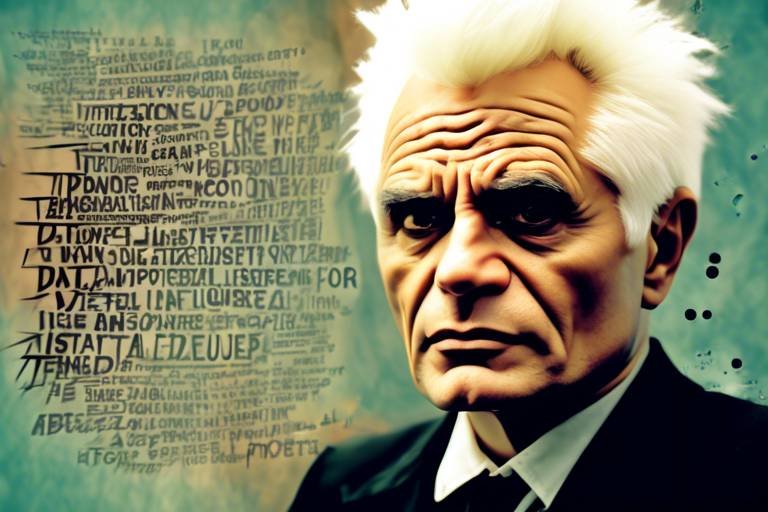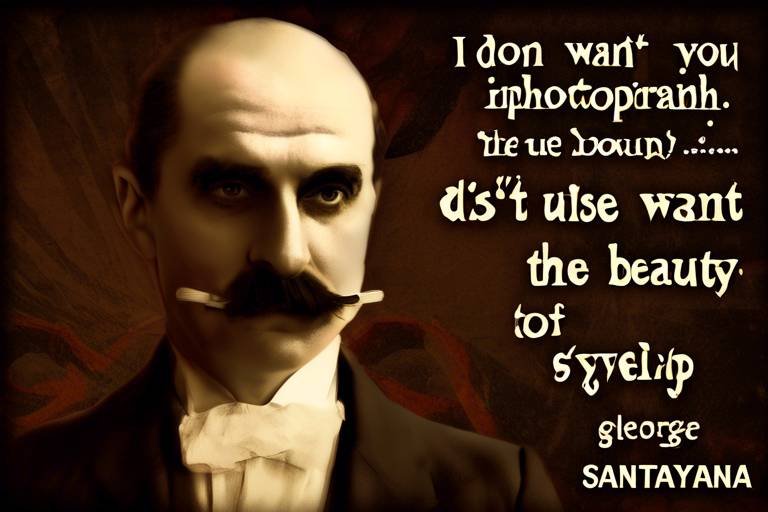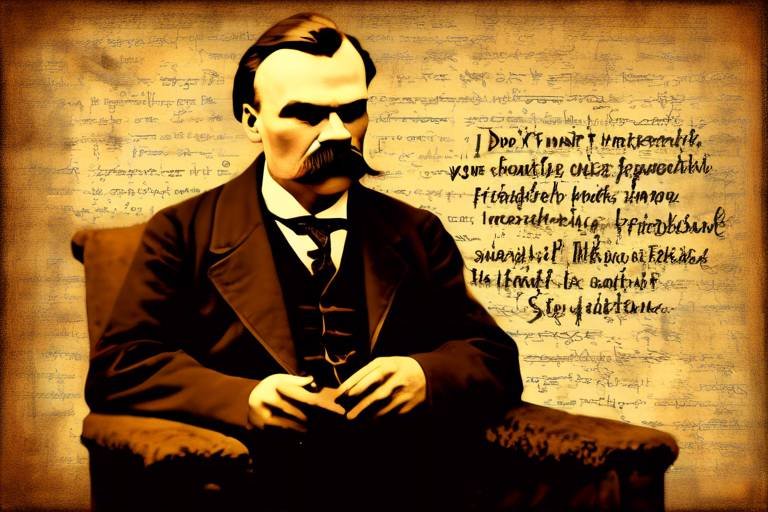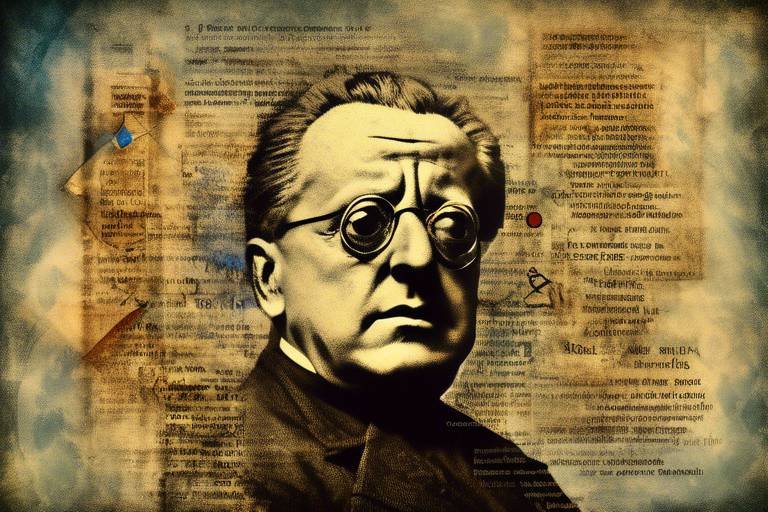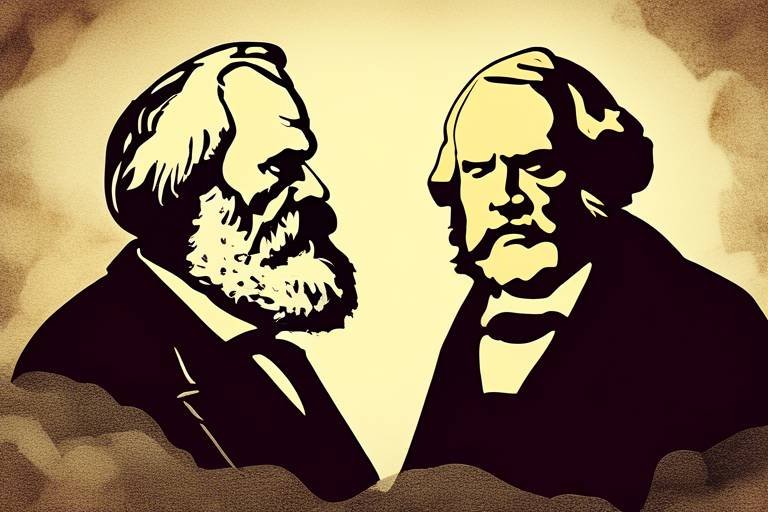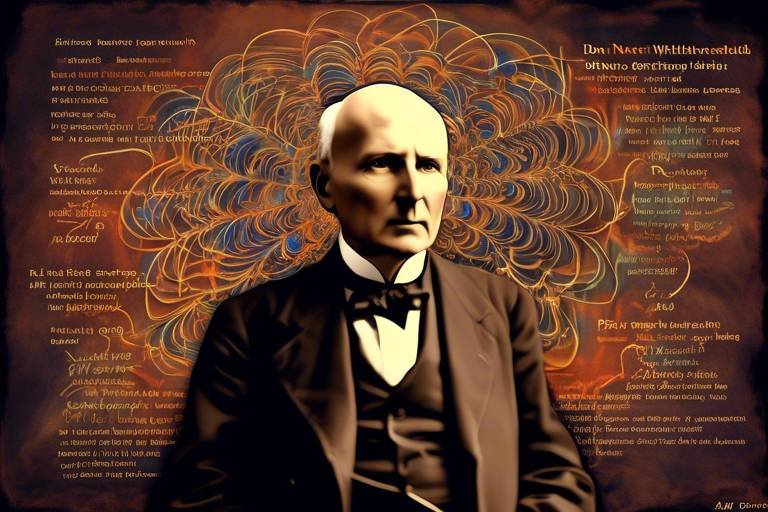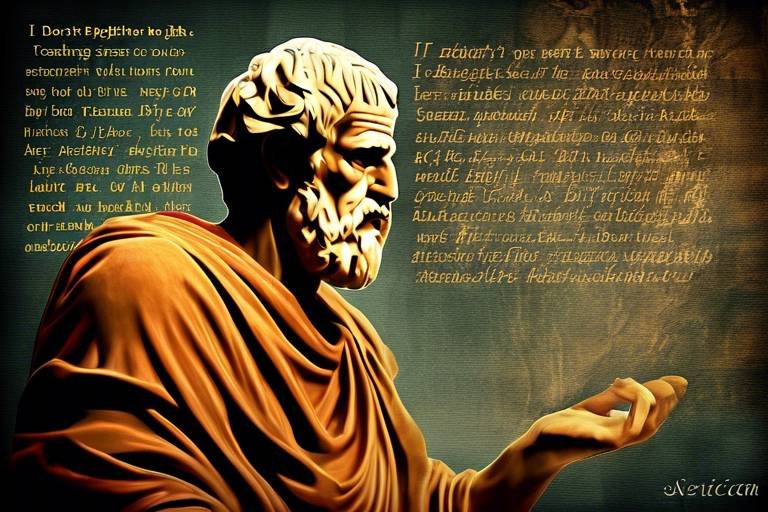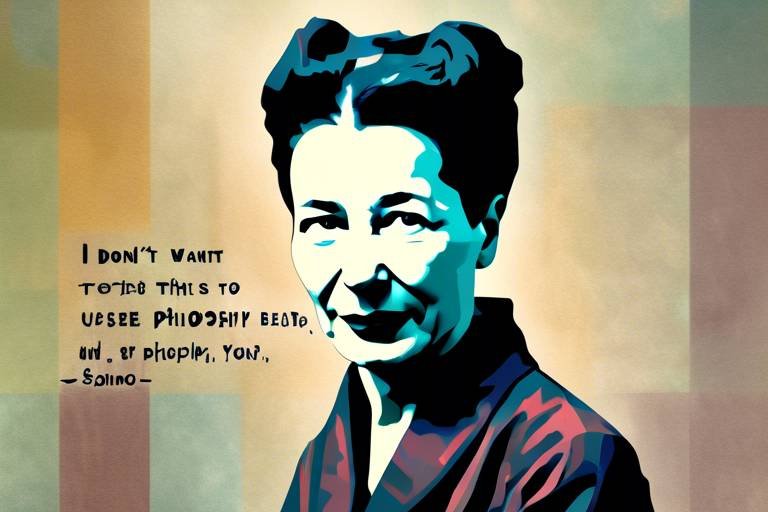The Legacy of Nietzsche’s Overman (Ubermensch) Philosophy
Friedrich Nietzsche, a name that resonates through the corridors of philosophical thought, introduced the concept of the Overman, or Übermensch, as a radical departure from traditional moral frameworks. This idea is not just a theoretical construct; it serves as a profound challenge to the very essence of what it means to be human. The Overman represents an idealized individual who transcends the limitations imposed by societal norms and conventional morality. But what does it really mean to be an Overman? In a world that often feels constrained by rules and expectations, Nietzsche's vision invites us to explore the depths of our own potential.
At its core, the Overman embodies the spirit of self-overcoming and creative potential. Imagine a person who refuses to settle for mediocrity, who dares to break free from the shackles of societal expectations and carve their own path. This is the essence of the Overman—a figure who not only challenges the status quo but also inspires others to do the same. Nietzsche's philosophy encourages us to look within and discover our own strengths, pushing the boundaries of what we believe is possible. It’s about becoming the architect of our own destiny.
Nietzsche's critique of traditional morality is equally significant. He argues that the moral values upheld by society often serve to suppress individual greatness. Instead of adhering to these imposed standards, the Overman champions a new moral framework that prioritizes individual strength and creativity. This shift in perspective is liberating, as it allows for a more authentic existence, free from the constraints of conformity. In essence, Nietzsche calls for a re-evaluation of ethics—one that embraces personal autonomy and celebrates the unique contributions of each individual.
Central to this philosophy is the concept of the Will to Power, which Nietzsche posits as a fundamental human instinct. The Overman exemplifies this drive for self-assertion and mastery, representing the pinnacle of human potential. It’s as if Nietzsche is saying, “Harness your inner strength, and let it propel you toward greatness.” This idea resonates deeply in today’s world, where many are seeking to reclaim their power and assert their individuality in a society that often promotes conformity.
The journey toward becoming an Overman involves a process of self-overcoming. This notion is not merely about personal growth; it’s about breaking through the barriers that hold us back. Whether these limitations are self-imposed doubts or societal pressures, the Overman teaches us that we have the power to transcend them. Imagine standing at the foot of a mountain, the summit representing your ultimate potential. The climb may be arduous, but the view from the top is worth every effort. This metaphor captures the essence of self-overcoming—it's about the struggle that leads to personal transformation.
Moreover, the Overman is a beacon of creative expression. Nietzsche believed that creativity is not just an artistic endeavor; it’s a vital part of human existence. In pursuing the Overman ideal, individuals are encouraged to embrace their creative impulses, whether through art, writing, or innovative thinking. In a world that often stifles creativity, the Overman reminds us of the importance of self-expression. It’s about finding your voice and using it to make an impact. Think of creativity as a river that flows through each of us, waiting to burst forth and carve new paths in the landscape of our lives.
Individualism is another cornerstone of Nietzsche’s philosophy. The Overman promotes the idea of personal autonomy, urging us to reject the herd mentality that often dominates societal thinking. This emphasis on self-determination encourages individuals to take charge of their own lives and make choices that align with their true selves. In a society that often pressures us to conform, embracing individualism can feel like a radical act. It’s akin to being a lone wolf in a pack, charting your own course while others follow the crowd.
As we explore the legacy of Nietzsche’s Overman, it becomes clear that this philosophy has far-reaching implications. Its influence extends beyond the realm of philosophy, impacting fields such as psychology, art, and even politics. The Overman serves as a model for those seeking to forge their own paths, emphasizing the importance of personal meaning and choice. In a world filled with distractions and external pressures, Nietzsche's vision encourages us to dig deep and discover what truly matters to us.
- What is the Overman in Nietzsche's philosophy?
The Overman, or Übermensch, represents an ideal individual who transcends traditional morality and societal norms, embodying self-overcoming and creative potential.
- How does the Overman challenge traditional morality?
Nietzsche critiques conventional moral values, advocating for a re-evaluation of ethics that prioritizes individual strength and creativity over societal conformity.
- What does the Will to Power signify?
The Will to Power is a central concept in Nietzsche's philosophy, emphasizing the drive for self-assertion and mastery that the Overman exemplifies.
- Why is individualism important in Nietzsche's philosophy?
Individualism is crucial as it promotes personal autonomy and encourages individuals to reject the herd mentality in favor of self-determination.

The Concept of the Overman
The concept of the Overman, or Übermensch, is one of the most intriguing ideas presented by Friedrich Nietzsche. It represents an idealized individual who has not only transcended traditional morality but has also broken free from the constraints imposed by societal norms. Imagine someone who embodies the essence of self-overcoming and possesses an incredible creative potential. This individual is not merely a product of their environment; instead, they actively shape their own destiny and values. But where did this idea originate, and what does it truly mean?
Nietzsche introduced the Overman as a response to the crisis of values that he perceived in modern society. As he saw it, conventional morality was rooted in outdated beliefs that stifled human potential. The Overman, therefore, is a radical departure from these norms, representing a new kind of individual who is capable of creating their own moral framework. This notion challenges us to think about what it means to be truly free and self-determined. In essence, the Overman stands as a beacon of hope in a world that often feels chaotic and devoid of meaning.
To better understand the Overman, we can break down its core characteristics:
- Transcendence of Conventional Morality: The Overman does not adhere to societal expectations. Instead, they create their own values and live by them.
- Self-Overcoming: This individual continually strives to surpass their limitations, both personal and societal, in pursuit of their true potential.
- Creative Expression: The Overman is a figure of artistic and intellectual creativity, emphasizing the importance of self-expression in realizing one’s vision.
- Individualism: At the heart of the Overman is a strong sense of personal autonomy, rejecting the herd mentality that often dominates society.
Nietzsche's Overman is not just a philosophical construct; it serves as a guiding principle for how we might navigate our own lives. In a world filled with distractions and external pressures, the idea of the Overman encourages us to look inward, to challenge ourselves, and to embrace our unique paths. It’s about recognizing that we have the power to define our existence and create meaning in our lives. As we delve deeper into Nietzsche's philosophy, we will uncover how this concept not only critiques traditional morality but also lays the groundwork for a more profound understanding of human potential.
In conclusion, the Overman is a complex and multifaceted idea that continues to resonate in modern thought. By embodying the principles of self-overcoming, creative expression, and individualism, the Overman invites us to reflect on our own lives and the values we hold dear. Are we merely conforming to the expectations of others, or are we striving to become our own versions of the Overman?

Nietzsche’s Critique of Traditional Morality
Friedrich Nietzsche, a philosopher whose ideas continue to ignite debate and inspire thought, boldly challenged the very foundations of traditional morality. He argued that the moral values upheld by society, often rooted in religious dogma and cultural norms, were not universal truths but rather constructs that stifled individual potential and creativity. Nietzsche's critique was not merely a rejection of these values but a call to re-evaluate them in the light of human experience and personal strength.
At the heart of Nietzsche's philosophy is the belief that many of the morals we adhere to are born from a slave morality, which prioritizes weakness, humility, and conformity over strength, power, and individuality. He posited that the prevailing moral frameworks were designed to keep the masses in check, promoting a herd mentality that discouraged personal excellence. Instead, Nietzsche envisioned a new moral landscape where the Overman could thrive—an individual who transcends societal expectations and embraces their own values.
Nietzsche's challenge to traditional morality can be summarized in several key points:
- Morality as a Construct: Nietzsche believed that moral values are not inherent truths but socially constructed norms that vary across cultures and epochs.
- The Revaluation of Values: He called for a revaluation of values, urging individuals to question and redefine what is deemed 'good' or 'bad' based on personal experience and strength.
- Emphasis on Individual Strength: Nietzsche advocated for a morality that celebrates individual strength, creativity, and the will to power, contrasting sharply with the self-denying values of traditional morality.
In this light, the Overman becomes a symbol of this new moral paradigm. Rather than adhering to the moral codes imposed by society, the Overman creates their own values, serving as both a philosophical ideal and a practical guide for living authentically. This radical idea encourages individuals to break free from the constraints of herd morality and to pursue their own paths, even if it means challenging the status quo.
Nietzsche's critique also extends to the implications of adhering to traditional moral values. He argued that such adherence often leads to a sense of guilt and resentment, particularly when individuals are unable to live up to the ideals set by society. This internal conflict can be debilitating, resulting in a cycle of self-doubt and conformity that stifles true potential. By embracing the philosophy of the Overman, individuals can liberate themselves from these burdens, allowing for a more authentic and fulfilling existence.
Ultimately, Nietzsche's critique of traditional morality is a clarion call for self-exploration and personal empowerment. It invites us to question the values we inherit and to actively engage in the process of self-definition. This journey of self-discovery is not just philosophical; it has practical implications for how we live our lives, make decisions, and interact with the world around us. In a society that often prioritizes conformity over individuality, Nietzsche's message resonates more than ever, urging us to embrace our unique potential and to live boldly as our own moral architects.
- What is Nietzsche's concept of the Overman?
Nietzsche's Overman is an idealized individual who transcends conventional morality, embodying self-overcoming and creative potential. - How does Nietzsche view traditional morality?
He critiques traditional morality as a construct that promotes weakness and conformity, advocating for a re-evaluation based on individual strength. - What is the Will to Power?
The Will to Power is a central concept in Nietzsche's philosophy, emphasizing the drive for self-assertion and mastery over one's circumstances. - Why is individualism important in Nietzsche's philosophy?
Individualism is crucial as it promotes personal autonomy and the rejection of herd mentality, allowing for self-determination and authentic living.

The Will to Power
At the heart of Nietzsche's philosophy lies the provocative concept of the Will to Power, a fundamental drive that he posits as the essence of human existence. This idea is not merely about the desire for domination or control over others; rather, it represents a profound inner force that compels individuals to assert themselves, to strive for mastery, and to transcend their limitations. Imagine the Will to Power as a relentless river, carving its path through the landscape of our lives, shaping our thoughts, actions, and aspirations. It is this very drive that the Overman embodies, showcasing an individual who fully embraces their potential and refuses to be confined by traditional societal norms.
Nietzsche argues that the Will to Power is an intrinsic part of our nature, urging us to grow, innovate, and redefine our existence. In this context, the Overman is not just a figure of strength; he is a beacon of creativity and self-assertion. This philosophy challenges us to reflect on our motivations and the underlying forces that drive our actions. Are we merely conforming to societal expectations, or are we actively engaging with our inner desires to forge our unique paths?
To further illustrate the essence of the Will to Power, consider the following key aspects:
- Self-Assertion: The Will to Power encourages individuals to assert their identities and beliefs, pushing against the confines of conventional morality.
- Creativity: It fosters a spirit of innovation, enabling individuals to create new values and meanings in their lives.
- Growth: The drive to overcome challenges and limitations is a testament to the human capacity for growth and self-improvement.
Nietzsche's exploration of the Will to Power also leads to a re-evaluation of strength, not as a mere physical attribute, but as a multifaceted quality that encompasses intellectual, emotional, and spiritual dimensions. The Overman, therefore, becomes a symbol of this holistic strength, representing the ideal individual who has harnessed their Will to Power to transcend mediocrity and embrace their authentic selves.
In contemporary society, the implications of the Will to Power are vast. It invites us to question the status quo, to challenge the limitations imposed by external forces, and to cultivate our unique voices. By embracing this philosophy, we can strive towards becoming our own Overmen, individuals who not only exist but actively shape their destinies. So, the next time you feel constrained by societal expectations, ask yourself: what would your Will to Power urge you to do? How can you channel that energy to break free and pursue your true potential?

Self-Overcoming
The journey of is at the heart of Nietzsche's vision of the Overman. It’s not just about personal growth; it's about a radical transformation of the self that defies the limitations imposed by society and our own fears. Imagine standing at the foot of a mountain, looking up at its peak, feeling both awe and trepidation. That mountain represents our potential, and the climb symbolizes the arduous yet rewarding process of self-overcoming. Just as a climber must confront their physical and mental barriers, we too must face our deepest insecurities and societal expectations to reach our true selves.
Self-overcoming involves a continuous cycle of challenge and growth. It requires us to step outside our comfort zones and embrace discomfort as a catalyst for change. Nietzsche believed that every individual has the power to transcend their current state by confronting the very essence of who they are. This process can be likened to a phoenix rising from the ashes; it’s about shedding old identities and beliefs to emerge stronger and more authentic. The Overman is not simply a figure of strength but one who has undergone this transformative journey, constantly redefining themselves in the face of adversity.
Moreover, the concept of self-overcoming is intricately linked to the idea of personal responsibility. Nietzsche posits that we must take ownership of our choices and actions, shaping our destinies rather than letting external forces dictate our paths. This notion can be daunting, as it places the onus of change squarely on our shoulders. However, it also empowers us to become architects of our own lives. To illustrate this, consider the following steps that can facilitate self-overcoming:
- Acknowledge Limitations: Recognize the beliefs and fears that hold you back.
- Set Intentions: Define clear goals that challenge your current state.
- Embrace Discomfort: Understand that growth often comes from facing uncomfortable situations.
- Reflect and Adapt: Regularly assess your progress and be willing to adjust your approach.
Ultimately, self-overcoming is not a destination but a lifelong journey. It’s about embracing the struggle and finding meaning in the process. Nietzsche’s Overman serves as a beacon of this ideal, inspiring us to push beyond our limits and strive for greatness. So, the next time you feel like giving up or conforming to societal norms, remember that the path of the Overman is paved with the stones of self-overcoming. It’s a path worth taking, full of surprises and personal explosions of growth that can lead to a more fulfilling existence.
- What is the Overman in Nietzsche's philosophy? The Overman, or Übermensch, represents an ideal individual who transcends traditional morality and societal norms, embodying self-overcoming and creative potential.
- How does self-overcoming relate to personal growth? Self-overcoming is the process of confronting and overcoming personal limitations and societal constraints, which is essential for achieving one's full potential.
- Why is individualism important in Nietzsche's philosophy? Individualism promotes personal autonomy and encourages individuals to reject herd mentality in favor of self-determination and authenticity.

Creative Expression
When we talk about the Overman, we can't overlook the immense significance of in Nietzsche's philosophy. The Overman is not just a figure who exists in isolation; rather, he is a beacon of artistic and intellectual vitality. Imagine a world where every individual harnesses their unique talents and passions to create something extraordinary. This is precisely what Nietzsche envisioned—a society where people break free from the shackles of conformity and embrace their creative potential.
At its core, creative expression is about more than just producing art; it's about authenticity and the courage to share one's inner self with the world. Nietzsche believed that the Overman exemplifies this authenticity, as he is unafraid to challenge the status quo and redefine what it means to be human. In this sense, the Overman becomes a catalyst for change, inspiring others to explore their own creative inclinations and push boundaries.
In contemporary society, we see this idea manifest in various forms—be it through art, literature, music, or even entrepreneurial ventures. The Overman's call for creativity resonates deeply in today's world, where individuals are encouraged to think outside the box and embrace their unique perspectives. This creative freedom not only enriches personal lives but also contributes to a more vibrant and dynamic culture.
Moreover, Nietzsche's philosophy suggests that the act of creation itself is a form of self-affirmation. When individuals engage in creative activities, they assert their existence and their values. This is where the concept of the Will to Power comes into play, as the Overman channels this drive into artistic endeavors. By doing so, he not only expresses himself but also challenges others to recognize their potential and find their voice.
To illustrate the importance of creative expression in the context of the Overman, consider the following table that highlights key aspects of this relationship:
| Aspect | Description |
|---|---|
| Authenticity | The Overman embodies true self-expression, free from societal constraints. |
| Innovation | Encourages new ideas and approaches, fostering a culture of creativity. |
| Influence | Inspires others to pursue their passions and embrace their individuality. |
| Self-Realization | Facilitates personal growth and the discovery of one's true self. |
Ultimately, the Overman's relationship with creative expression serves as a powerful reminder of the potential that lies within each of us. By embracing our creative instincts, we not only honor our individuality but also contribute to a richer, more diverse world. So, the next time you pick up a paintbrush, write a poem, or compose a song, remember that you are tapping into the essence of what it means to be an Overman—an individual who dares to create, innovate, and inspire.
- What is the Overman in Nietzsche's philosophy? The Overman represents an ideal individual who transcends traditional morality and societal norms, embodying self-overcoming and creative potential.
- How does creative expression relate to the Overman? Creative expression is a key aspect of the Overman, as it reflects authenticity, individuality, and the courage to challenge societal norms.
- Why is authenticity important in Nietzsche's philosophy? Authenticity allows individuals to express their true selves and pursue genuine self-realization, which is essential for achieving the Overman ideal.
- How can I embrace my creativity? Embracing creativity involves exploring your passions, taking risks, and allowing yourself the freedom to express your unique perspective.

The Role of Individualism
When we dive into Nietzsche’s philosophy, we quickly realize that individualism is not just a concept; it's the very essence of what it means to be truly alive. Nietzsche’s Overman represents a radical departure from the herd mentality that often dominates society. Imagine being in a crowd where everyone is marching to the same beat, following the same rules, and adhering to the same norms. Now picture someone breaking away from that crowd, dancing to their own rhythm, and crafting their own path. This is what Nietzsche envisioned with the Overman: a figure who not only embraces their individuality but also celebrates it.
In a world that often pressures us to conform, Nietzsche's Overman acts as a beacon of hope, encouraging us to embrace our unique traits and perspectives. The Overman challenges us to reject the values imposed by society and instead forge our own. This process of self-discovery and self-definition is not merely an act of rebellion; it's a profound journey towards personal empowerment. Nietzsche believed that true greatness lies in the ability to rise above societal expectations and to create a life that resonates with our inner truths.
But what does it mean to truly be an individual in Nietzsche’s eyes? It involves a deep understanding of oneself, a willingness to confront uncomfortable truths, and the courage to act in accordance with one’s own values. This is where the concept of the Will to Power comes into play. The Overman embodies this drive, harnessing personal strength to shape their destiny. It’s about taking the reins of your life and steering it in the direction that feels right to you, rather than simply following the paths laid out by others.
Moreover, Nietzsche’s emphasis on individualism also highlights the importance of creativity in human existence. The Overman is not just a solitary figure; they are also a creator, an artist, and a thinker. They understand that life is a canvas, and it’s up to them to paint it with their own colors. This creative expression is vital for achieving a fulfilling life, as it allows individuals to manifest their inner visions and share them with the world. In today’s society, where conformity can often stifle creativity, Nietzsche’s philosophy serves as a powerful reminder of the importance of being true to oneself.
In summary, the role of individualism in Nietzsche’s Overman philosophy is a call to action for each of us. It invites us to break free from societal constraints, embrace our unique identities, and express ourselves authentically. By doing so, we not only honor our own existence but also contribute to the richness of human experience as a whole. So, the next time you find yourself feeling pressured to conform, remember the Overman and the incredible power of being your true self.
- What is the Overman in Nietzsche's philosophy?
The Overman, or Übermensch, is an idealized individual who transcends traditional morality and societal norms, embodying self-overcoming and creative potential.
- How does individualism relate to the Overman?
Individualism is central to the Overman concept, as it encourages personal autonomy and the rejection of herd mentality in favor of self-determination.
- What is the Will to Power?
The Will to Power is a fundamental drive in Nietzsche's philosophy, emphasizing self-assertion and mastery, which the Overman exemplifies.
- Why is creativity important in Nietzsche's philosophy?
Creativity is vital for achieving the Overman ideal, as it allows individuals to express their unique identities and contribute to the world in meaningful ways.

Influence on Existentialism
The influence of Nietzsche’s concept of the Overman on existentialism is profound and far-reaching. Existentialist thinkers, such as Jean-Paul Sartre and Martin Heidegger, have drawn from Nietzsche’s ideas to develop their own philosophical frameworks. At the core of this relationship is the idea that individuals are not bound by pre-existing moral structures but are instead responsible for creating their own values and meaning in life. This notion resonates deeply with the existentialist emphasis on personal freedom and authenticity.
Nietzsche's Overman serves as a beacon for those seeking to break free from societal constraints. He challenges the notion that individuals should conform to the expectations and norms dictated by society. Instead, he advocates for a radical form of individualism where the Overman rises above the herd mentality, embracing the chaos of existence and crafting a unique path. This idea can be likened to a lone wolf navigating through a dense forest, unafraid to forge its own trail, rather than following the pack.
One of the most significant connections between Nietzsche's philosophy and existentialism lies in the concept of existential freedom. The Overman embodies this freedom, representing the potential for individuals to define their own essence through their choices. In a world where traditional values are increasingly questioned, the Overman encourages a shift away from external validation towards internal self-affirmation. This is where the existentialists find their footing, as they emphasize the importance of personal choice and responsibility in the face of an indifferent universe.
Moreover, Nietzsche's emphasis on authenticity aligns seamlessly with existentialist thought. To achieve the ideal of the Overman, one must engage in a process of self-exploration and self-realization. This journey often requires confronting uncomfortable truths about oneself and society. It's akin to peeling back the layers of an onion, revealing the core of one’s being while discarding the superficialities imposed by external influences. Such authenticity is crucial for individuals striving to live genuinely in a world filled with distractions and societal pressures.
In summary, the legacy of Nietzsche's Overman philosophy profoundly influences existentialism by advocating for personal freedom, authenticity, and the creation of individual values. The Overman serves as a model for those who wish to transcend the limitations of conventional morality, encouraging a life of self-determination and creative expression. As we navigate the complexities of modern existence, the lessons drawn from Nietzsche continue to resonate, urging us to embrace our potential and define our own paths.
- What is the Overman in Nietzsche's philosophy? The Overman, or Übermensch, represents an ideal individual who transcends traditional morality and societal norms, embodying self-overcoming and creative potential.
- How does Nietzsche's Overman relate to existentialism? The Overman influences existentialist thought by promoting individual freedom, choice, and the creation of personal values, challenging conventional moral frameworks.
- Why is authenticity important in Nietzsche's philosophy? Authenticity is vital for achieving the Overman ideal, as it encourages individuals to pursue genuine self-realization amidst societal pressures and expectations.
- Can anyone become an Overman? Nietzsche suggests that anyone can strive towards becoming an Overman by engaging in self-overcoming and embracing their creative potential.

Existential Freedom
When we talk about , we're diving into one of the most exhilarating aspects of Nietzsche's philosophy. The Overman, or Ubermensch, isn't just a figure of strength and creativity; he embodies the essence of freedom itself. Imagine standing on the edge of a cliff, the wind whipping through your hair, and the vast expanse of possibility stretching out before you. This is the kind of freedom Nietzsche envisions—a freedom that isn't merely the absence of constraints but a profound ability to forge one's own path and create one’s own values.
At its core, existential freedom challenges the very foundations of how we perceive morality and meaning. It begs the question: what if we could define our own existence, unshackled from societal norms and expectations? The Overman does just that; he rejects the idea that values are handed down from above, instead insisting that true meaning must be crafted by the individual. This notion can be both liberating and terrifying. After all, if you are responsible for creating your own values, you also bear the weight of that responsibility. It’s like being the captain of your own ship in a vast ocean—exciting, yet daunting.
Nietzsche's philosophy encourages us to embrace this freedom, to step into the unknown with courage and creativity. It's not enough to merely exist; we must strive to thrive. The Overman exemplifies this by transforming challenges into opportunities for growth. He sees obstacles not as barriers but as stepping stones toward self-actualization. This perspective resonates deeply in today's world, where many feel trapped by societal expectations or the relentless pressure to conform. In a sense, Nietzsche is urging us to break free from the herd mentality and to trust our instincts.
Moreover, the concept of existential freedom is intricately linked to the idea of authenticity. To be authentic means to live in accordance with one's true self, rather than adhering to the roles society imposes. The Overman is the ultimate symbol of authenticity, as he creates values that reflect his unique experiences and insights. This journey toward authenticity is not without its challenges, as it requires a deep introspection and a willingness to confront uncomfortable truths about oneself. However, the rewards are immense—a life lived fully, with purpose and passion.
In practical terms, embracing existential freedom means taking conscious steps toward self-discovery and personal growth. Here are a few ways to cultivate this freedom in your own life:
- Reflect on Your Values: Take time to examine what truly matters to you. Are your beliefs your own, or have they been shaped by societal influences?
- Challenge Norms: Don't be afraid to question societal expectations. What if you chose a different path? What would that look like?
- Embrace Creativity: Find outlets for self-expression, whether through art, writing, or any other medium that resonates with you.
- Accept Responsibility: Acknowledge that your choices shape your reality. Embrace the power that comes with this understanding.
Ultimately, existential freedom is about crafting a life that is uniquely yours. The Overman serves as a guiding light, reminding us that we have the power to shape our destiny. So, the next time you feel confined by the expectations of others, remember the spirit of the Overman. Embrace your freedom, and let your life be a canvas for your own values and aspirations.
- What is the Overman in Nietzsche's philosophy? The Overman, or Ubermensch, is an idealized individual who transcends traditional morality and societal norms, embodying self-overcoming and creative potential.
- How does existential freedom relate to the Overman? Existential freedom is the ability to create one's own values and meaning, which is a fundamental aspect of the Overman's philosophy.
- What steps can I take to embrace existential freedom? Reflect on your values, challenge societal norms, embrace creativity, and accept the responsibility of your choices.

Authenticity and Self-Realization
When we talk about authenticity and self-realization in the context of Nietzsche's philosophy, we are diving deep into the essence of what it means to truly be oneself. Nietzsche believed that the Overman, or Übermensch, serves as a beacon for individuals striving to break free from the constraints imposed by society and traditional norms. But what does it really mean to be authentic? And how does one achieve self-realization?
Authenticity is about being true to oneself, embracing one's unique qualities, and rejecting the pressures to conform to societal expectations. Nietzsche argued that many people live in a state of inauthenticity, merely following the herd, adopting values and beliefs handed down by others without question. This blind acceptance stifles creativity and personal growth. The Overman, in contrast, is a figure who actively challenges these norms, forging their own path and creating their own values. Think of it as breaking out of a mold that society has cast you in—it's about shattering those chains and discovering who you truly are.
Self-realization, on the other hand, is the journey toward achieving your fullest potential. It’s not just about self-discovery; it’s about actively cultivating your abilities and passions. Nietzsche believed that the path to becoming an Overman is fraught with challenges, requiring individuals to confront their fears, limitations, and societal expectations. This process of self-overcoming is essential. Just like a sculptor chisels away at a block of marble to reveal a masterpiece, individuals must chip away at their insecurities and doubts to uncover their true selves.
To illustrate how authenticity and self-realization intertwine, consider the following key aspects:
- Personal Values: Embrace your own set of values rather than adopting those of others. Reflect on what truly matters to you.
- Creative Expression: Engage in activities that allow you to express yourself uniquely—be it through art, writing, or even your career.
- Continuous Growth: Commit to lifelong learning and self-improvement. The journey of self-realization never truly ends.
In today's world, where social media often dictates trends and norms, the challenge of remaining authentic is more pressing than ever. The pressure to fit in can be overwhelming, but Nietzsche’s philosophy encourages us to dig deep and ask ourselves: Who am I really? The Overman embodies the courage to answer that question honestly and to live in alignment with that truth.
Ultimately, embracing authenticity and striving for self-realization is not just about personal fulfillment; it’s about contributing to the greater tapestry of human experience. When individuals live authentically, they inspire others to do the same, creating a ripple effect of self-discovery and empowerment. As we navigate through life, let’s remember that the journey to becoming an Overman is not just a personal endeavor but a collective one, where each step towards authenticity enriches the world around us.
- What does it mean to be authentic? Authenticity refers to being true to oneself, embracing one's unique qualities, and rejecting societal pressures to conform.
- How can I achieve self-realization? Achieving self-realization involves self-discovery, personal growth, and actively cultivating your abilities and passions.
- Why is Nietzsche's concept of the Overman important? The Overman represents an ideal of self-overcoming and creativity, encouraging individuals to challenge societal norms and create their own values.
Frequently Asked Questions
- What is Nietzsche's concept of the Overman?
The Overman, or Übermensch, is an idealized individual who surpasses conventional morality and societal norms. Nietzsche envisioned the Overman as someone who embodies self-overcoming, creativity, and a new moral framework that prioritizes individual strength and personal values over societal expectations.
- How does Nietzsche critique traditional morality?
Nietzsche challenges established moral values by advocating for a re-evaluation of ethics. He believes that traditional morality often suppresses individuality and creativity. The Overman serves as a model for a new moral perspective that encourages personal autonomy and the rejection of conformity.
- What is the significance of the Will to Power in Nietzsche's philosophy?
The Will to Power is a central theme in Nietzsche's thought, representing the fundamental drive for self-assertion and mastery. The Overman exemplifies this concept by actively pursuing personal growth and creative expression, emphasizing the importance of overcoming obstacles to achieve one's highest potential.
- What does self-overcoming mean in the context of the Overman?
Self-overcoming refers to the process of transcending personal limitations and societal constraints. For Nietzsche, achieving the Overman ideal requires individuals to confront and overcome their fears, doubts, and the expectations placed upon them by society, ultimately realizing their full potential.
- How does the Overman relate to individualism?
Individualism is a cornerstone of Nietzsche's philosophy. The Overman promotes the idea of personal autonomy and encourages individuals to break away from the herd mentality. By embracing self-determination, the Overman inspires others to forge their own paths and create their own values.
- In what ways has the Overman influenced existentialism?
The concept of the Overman has had a profound impact on existentialist thinkers. It emphasizes the importance of personal meaning and choice, encouraging individuals to create their own values and embrace existential freedom. This connection highlights the ongoing relevance of Nietzsche's ideas in contemporary philosophical discourse.
- What role does authenticity play in achieving the Overman ideal?
Authenticity is crucial for realizing the Overman ideal. Nietzsche's philosophy encourages individuals to pursue genuine self-realization, even amid external pressures and societal expectations. By being true to oneself, one can embody the spirit of the Overman and fully embrace their creative potential.


